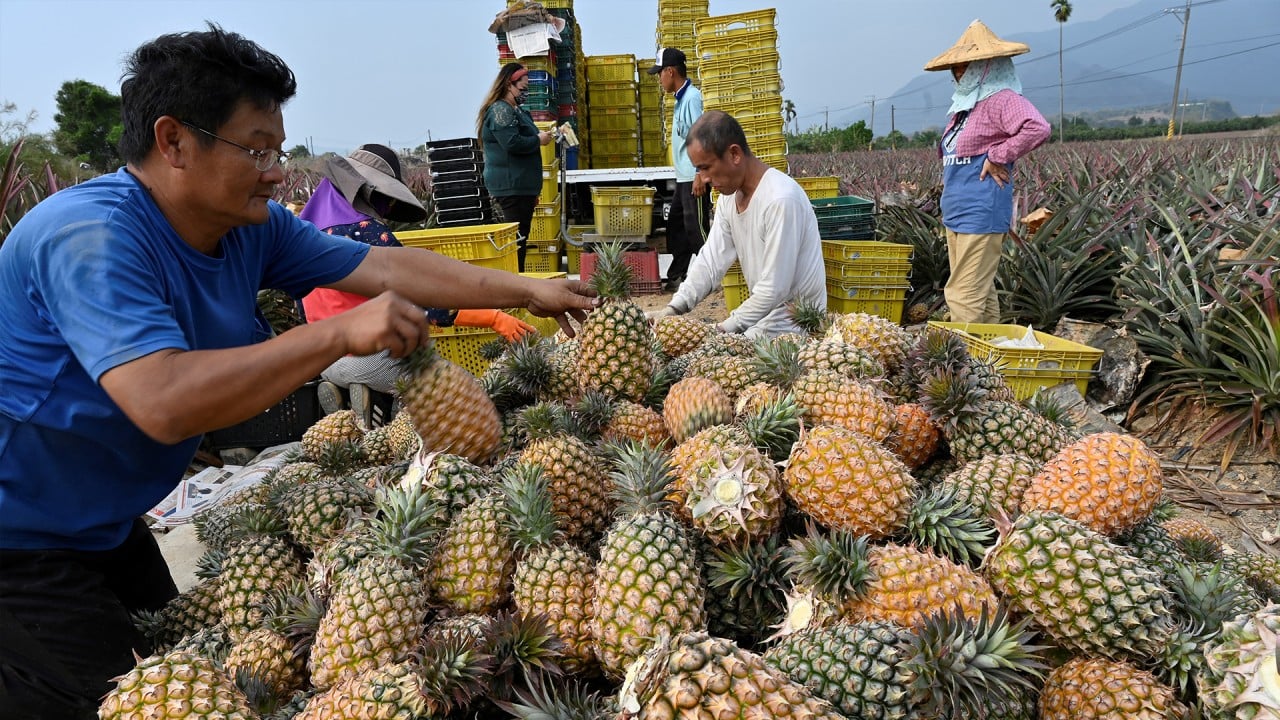
Mainland China, Taiwan farming cooperation could be fruitful – despite recent sour grapes
- Boosting the farming trade between mainland China, Taiwan could increase economic activity and mend frayed ties after relations have grown icy
- Industry insiders are receptive, but previous trade controls have spoiled progress and diminished trust
A proposal from mainland China to boost agricultural cooperation with Taiwan would be welcomed on the island because of the mainland’s market size, but export bans and cross-Strait tensions could slow any resultant momentum, people in the industry say.
“Whether tea growers or packagers, there should be space for cooperation,” said Yu Mao-fen, secretary of the Taiwan Tea Exporters Association in Taipei.
“People of Chinese ancestry drink a lot of tea, and the more of that the better. But cross-Strait ties are always up and down, so it’s hard for the sellers.”
At a meeting on November 30, the mainland’s Ministry of Agriculture and Rural Affairs pledged to find new fronts for bolstering ties in the field.
The ministry called for improving a 14-year-old Taiwan Farmers Entrepreneurship Park in Fuzhou and offering more cross-Strait agricultural exchanges.
“There is potential space for the integrated development of agriculture on both sides of the Taiwan Strait, and we must deeply understand challenges … make up for shortcomings, and improve the quality of agricultural work with Taiwan,” the ministry said after its meeting in Xiamen, a city just opposite the strait.
Taiwanese tea merchants understand mainland China’s market size and its vast range of varietals due to geographic scope, said Yu, whose association has about 100 members.
Taiwan can offer mainland growers help with tea production and the packing of leaves since that technology has “peaked” on the island, he said.
Companies in the trade already meet and talk in mainland China regularly, he said, including at annual conferences in Fujian province.
The mainland ministry further recommended the “creation of policies to provide more convenience for Taiwanese farmers and businessmen” in land use, financing and market development.
On the technology front, Taipei-based Ubiquity Sprouting Corporation has developed methods to grow organic mung beans, peanut sprouts and vegetables indoors while saving water.
When we eat, we’re not focused on politics
To date, farmers in Henan province have bought enough of his systems to farm up to 450 hectares of beans, and farmers in Shandong province have signed a purchase deal, company founder Lai Horng-ji said.
“The population is large and the market is large, while costs are low,” Lai said. “In Taiwan, we have just 23 million people. It’s not much of a market.”
Another potential area of cooperation would be in stopping illegal food additives, Lai said, though admitted it would be “pretty hard to break through on this issue”. He did add there could still be room for agreement, as “people in the mainland are afraid of these ‘blackheart foods’, and in Taiwan we’re afraid, too.
“When we eat, we’re not focused on politics.”
However, periodic bans on agricultural shipments to the mainland have reduced trust, some in the industry said.
Mainland customs officials effectively stalled other seafood imports in 2021 by changing regulations covering the business registrations of Taiwanese exporters, the 200-member Taiwan Frozen Seafood Industries Association said.
The share of Taiwan’s agricultural exports to the mainland fell to 12.9 per cent in 2022, according to domestic media reports citing the island’s Ministry of Agriculture – a significant drop from earlier years.
Beijing views self-ruled Taiwan as a breakaway territory that must be reunited, by force if necessary, and most countries do not recognise the island as an independent state.
Relations have soured over the past eight years, a trend that analysts say explains the deterioration in trade.
“Presently, Taiwan’s seafood merchants are limited by not smoothly getting registrations as offshore enterprises,” the frozen seafood trade group said.
“As for the mainland hoping to strengthen cooperation with enterprises in Taiwan agriculture, we’re afraid a substantive effect will be hard.”
Taiwan’s agricultural ministry did not answer a request for comment.
Mainland Chinese officials could view aiding Taiwan’s agricultural sector as a way to win favour in the fertile south of the island, said Chen Yi-fan, assistant professor of diplomacy and international relations at Tamkang University in Taiwan.
“Farmers desperately need a market to expand their sales,” he said. At present, the field makes up just 1.8 per cent of Taiwan’s gross domestic product.


